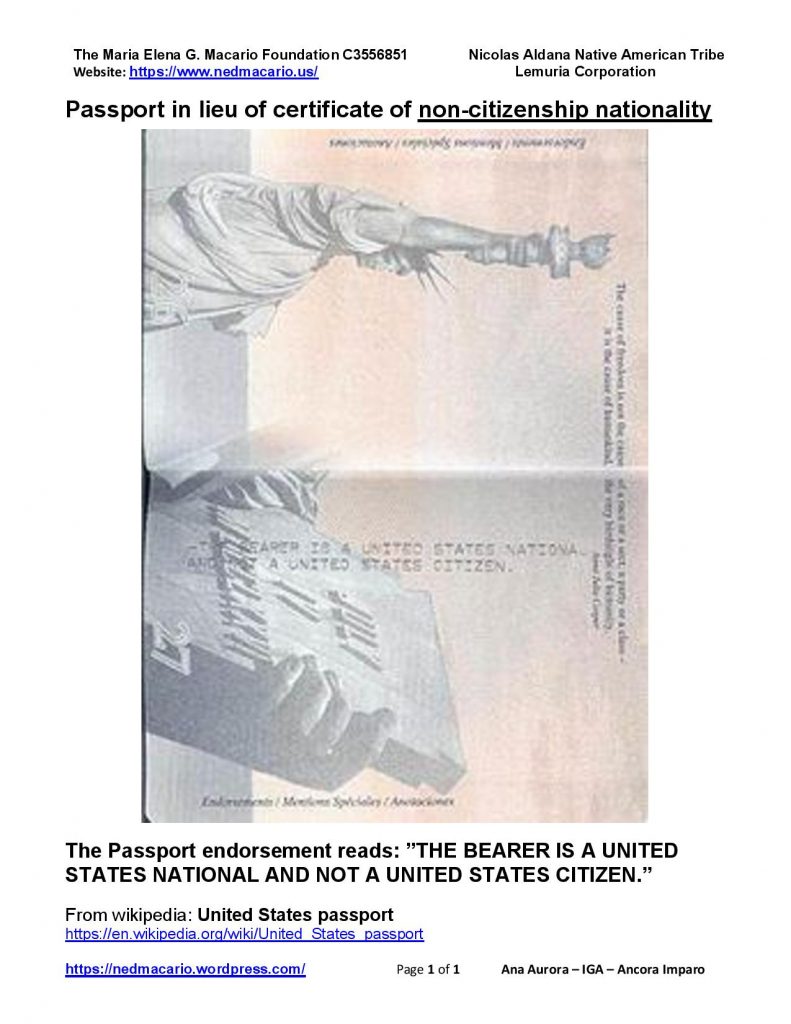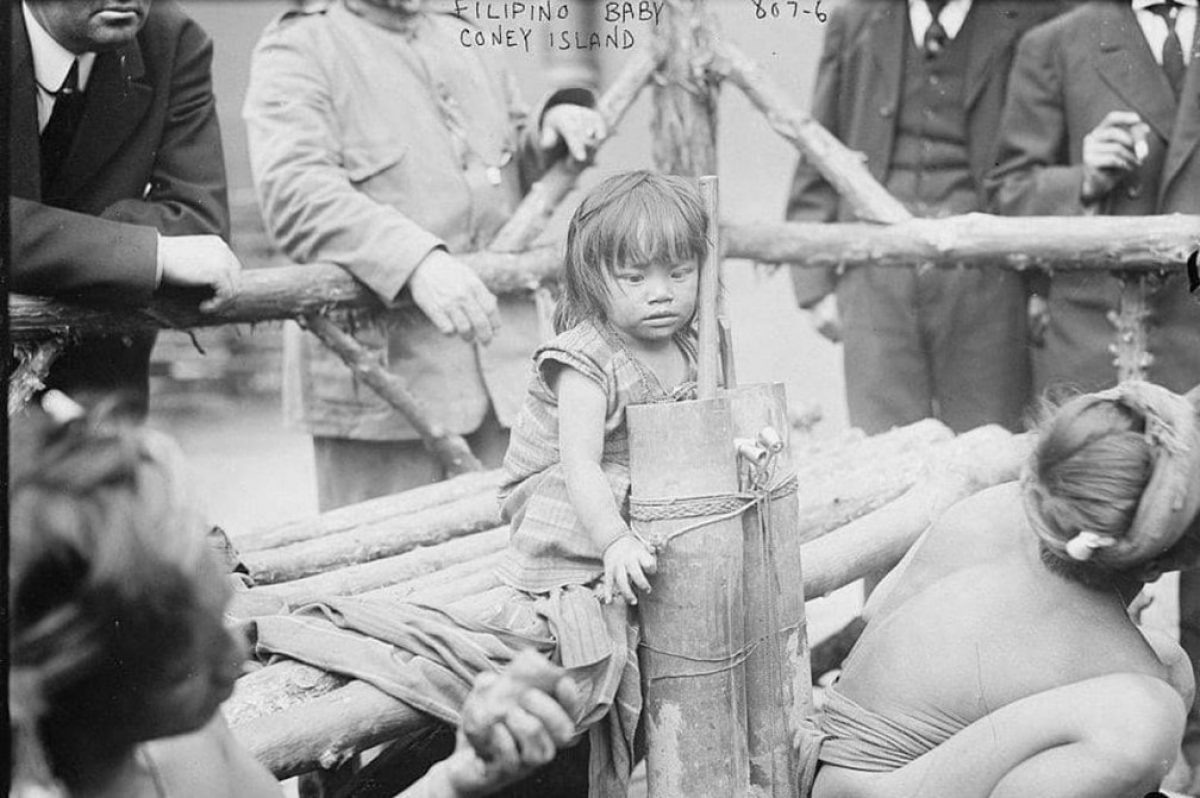Filipinos are Native Americans. Natives of all the lands the U.S. government purchased automatically became Native Americans. We all have a choice. Free will is God’s greatest gift. The most common way people lose their right and power is by believing that they do not have any right or power at all.
This video below reminds of what is going on in the Philippines today where the rising body count in the bloody war on drugs under Pres. Duterte has attracted the attention of the so-called civilized Western societies and where the poorest of the poor has but three choices: 1.) Leave the country; 2.) Become a prostitute or lead a life of crime; 3.) Eat garbage literally.
Let us dedicate this excerpt to the international community, especially the U.S. Senate that prematurely, irresponsibly and unconstitutionally granted the Philippines independence which was then a U.S. territory.
Movie: Ever After (1998) Part 3 at 7:28
Cargomaster: [flustered] Your Highness! F-forgive me, Sire. I meant no disrespect. It’s just, uh… I’m following orders here. It’s my job to take these criminals and thieves to the coast.
Danielle: A servant is not a thief, your Highness, and THOSE WHO ARE CANNOT HELP THEMSELVES.
Henry: Really! Well then by all means, enlighten us.
Danielle: If YOU SUFFER your people to be ill-educated, and THEIR MANNERS CORRUPTED from INFANCY, and THEN PUNISH THEM for those crimes to which their FIRST EDUCATION DISPOSED THEM, what else is to be concluded, sire, BUT THAT YOU FIRST MAKE THIEVES AND THEN PUNISH THEM?
[pause, the other courtiers look on approvingly]
Henry: Well, there you have it. Release him.
Movie: Ever After (1998) I love Drew’s pose in the portrait toward the end of the move. It’s also the perfect angle of a very good friend of mine.
https://www.youtube.com/watch?v=z8weRN5gJis
NOW LET’S GO BACK TO REALITY IN THE 21st CENTURY
This is from 2012 Dec. 6. Excerpt: “Regarding the WAIS topic “Collective Guilt and Making Amends,” here are my recommendations:
Manuel Roxas and all those who were granted amnesty by Roxas should be posthumously tried for treason. Their children and grandchildren must be removed from positions of power and authority. THEIR PROPERTY MUST BE CONFISCATED.
All Filipinos who are residents of an industrialized G-7 type country will be given TEMPORARY PROTECTED STATUS. For them to earn back their citizenship, they must take and pass a Philippine (History) re-education course.
In the meantime all international organizations like the World Bank, IMF, ADB and the UN must be required to submit an accounting of all the funds loaned or given to the Philippines. An investigation of past and present employees of the World Bank, IMF, UN and members of the US Congress Committee on Foreign Relations must be started.”
From: Collective Guilt and Atonement: Manila (Bienvenido Macario, USA) Thu, Dec 6, 2012 at 6:52 AM
http://waisworld.org/go.jsp?id=02a&objectType=post&o=73652&objectTypeId=65667&topicId=17
In fairness to Washington DC if we bring up an issue and lobby properly, they have no choice but to act. So a year later, on Dec. 14, 2013, TEMPORARY PROTECTED STATUS (TPS) for FILIPINOS has gained a strong U.S. bipartisan congressional support.
Seek and you will find.
Knock and the door will be open.
Knock naman ng pating.
Look what oligarchs traitors are doing – protect their vested interests, first and foremost! Instead of letting Filipinos work and live in the U.S. legally under the TEMPORARY PROTECTED STATUS, Aquino III opted not to act on it. Do you want to know why Aquino III and the oligarchs are against the TPS?
Aquino mum on TPS, leaves immigrants in the dark
By: Anthony Advincula – @inquirerdotnetINQUIRER.net US Bureau / 05:19 AM December 14, 2013
https://globalnation.inquirer.net/94053/aquino-mum-on-tps-leaves-immigrants-in-the-dark
NEW YORK — While TEMPORARY PROTECTED STATUS (TPS) for FILIPINOS has gained a strong U.S. bipartisan congressional support, the Philippine government has yet to lodge a formal request with the Obama administration, leaving in the dark many Filipinos who may benefit from it.
According to several Filipino-American leaders here, since Nov. 19, after more than 20 U.S. senators and representatives called on the Department of Homeland Security (DHS) to designate the Philippines for TPS
(http://lofgren.house.gov/uploads/TPS%20Philippines%20Final%20Letter.pdf), a number of letters from U.S.-based immigrant rights supporters and Filipino-American groups were sent to the Malacañang Palace, asking Philippine President Benigno Aquino III to make that written request — the first step in the TPS designation process.
“There have been a lot of letters sent already to Malacañang, but we’re not sure how many of them have actually made it on the desk of Pres. Aquino,” said Filipino-American Melissa Chua, supervising attorney in the Immigrant Protection Unit of New York Legal Assistance Group (NYLAG). “This is certainly taking longer than we expect.”
With devastation of Typhoon Yolanda (international name: Haiyan) in the Philippine islands, leaving more than 4,000 people dead and hundreds of thousands of people displaced, the Philippines meets the necessary requirements for TPS under Section 244 of the US Immigration and Nationality Act (http://www.uscis.gov/sites/default/files/ilink/docView/SLB/HTML/SLB/0-0-0-1/0-0-0-29/0-0-0-7238.html). Haiti, Syria Honduras, Nicaragua and Somalia are some of the countries currently designated with TPS in the United States.
However, even with an overwhelming backing of U.S. congress, the Homeland Security — the only U.S. government agency that could designate a country for TPS — cannot grant it for undocumented Filipinos and those who are on temporary non-immigrant visas (such as work, business, tourist and student visas) without the request from the Philippine government.
“In the case of Haiti, it took only a week after the earthquake there that Haitians were given TPS. It is a process that can happen quickly,” said Chua. “It seems to me that we only need to make Filipinos aware. This is a great opportunity, and I hope that this [slow action from the Philippine government] could just be an issue of education [on TPS].”
Meeting the criteria
If the Philippines granted TPS, undocumented Filipinos who meet the criteria could apply for temporary legal status and be given a work authorization, as well as may be able to obtain travel authorization. For those on temporary visas, they could legally extend their stay and work in the United States.
While it will not lead to a green card or permanent residency, those who will be afforded TPS would also get humanitarian form of relief from deportation or detention based on the individual’s immigration status, unless the person becomes ineligible or the country loses its TPS designation.
An individual convicted of any felony or two misdemeanors committed in the United States, or who fails to maintain continuous physical presence and residence in the country, is deemed ineligible for TPS.
“TPS would offer me and other Filipino workers a protection to work legally and without fear of deportation,” said Josie Gutierrez, who works as a nanny in New York City. “I want to ask the Aquino administration to request for TPS for the Filipino people, and I want to ask the Obama administration to approve it.”
Gutierrez, 53, who has been in the United States for 12 years, said that she sends $200 to her mother and $1,000 to her kids and siblings a month back home, in Biliran province, about 70 miles from Tacloban City — the hardest-hit area by Typhoon Yolanda.
When the storm wiped out Tacloban City, Gutierrez said that some of her cousins who lived there had lost their homes and livelihood. With almost no option, her cousins had to move in with her family in Biliran.
“The water was filled with debris and dead bodies. Nothing was left for them [cousins], even their clothes,” said Gutierrez. “Now, I am supporting 20 people back home.”
Cost-benefit analysis of TPS
Some Filipino-American leaders say that the biggest benefit the Philippines would get from TPS is the increase in the flow of remittances to the country during the recovery from Typhoon Yolanda. The World Bank (http://data.worldbank.org/indicator/BX.TRF.PWKR.DT.GD.ZS ) says more than 10 percent of the Philippines’ Gross Domestic Product (GDP) comes from remittances from Filipinos around the world — and a big chunk of it comes from Filipinos in the United States.
If TPS is not given, on the other hand, Filipinos who would have qualified will be forced to return to their homeland and, in turn, could exacerbate the economy affected by the storm and impose a great burden on restoration efforts.
The American Immigration Lawyers Association (AILA) says that nearly half a million Filipinos could be eligible for TPS. However, the Homeland Security will specify the eligibility requirements, including time of residence of the applicant and effective date of TPS designation, which could last for a period of six to 18 months and can be extended, if conditions continue to support the designation.
For example, Hondurans received TPS in January 1999 and will expire in January 2015. As for Haitians, the TPS was first designated in July 2011 and will end, if not extended, in July next year. (http://www.uscis.gov/humanitarian/temporary-protected-status-deferred-enforced-departure/temporary-protected-status)
“With eligibility requirements specified in the TPS designation, we can definitely see Filipinos who may be left out,” Chua added.
Mounting pressure, frustration
Almost a month after Typhoon Yolanda ripped through the Philippines, the frustration among Filipino-American leaders is building up and the pressure is mounting on Pres. Aquino to act on making formal TPS request for Filipinos in the United States.
On Wednesday, Filipino-American groups, lawyers and advocates, along with other civic organizations, in New York, California, Illinois and other states held a coordinated call to build awareness and push for TPS.
“We urge President Aquino to make this written request immediately to grant TPS for Filipinos,” said Rio Guerrero, member of the National Filipino American Lawyers Association during a press briefing in downtown Manhattan. “At this juncture, the Philippine government has not come up with any reasons why the written request has not been made yet— and this leaves us with speculations.”
Those speculations, according to some Filipino Americans here, include the Philippine government’s concern about the stigma that may be attached to a country designated with TPS, despite its economic benefit through remittances. Others say that the bureaucratic culture and politics in the Philippines create the hurdles.
But Guerrero said that he and fellow Filipino-American lawyers have reached out to the Philippine consulate in New York City and the Philippine embassy in Washington, D.C., hoping to find out the current status of the written request for TPS.
“Based on the information that we received, the decision rests with the Malacañang Palace,” he said. “They [consulate and embassy] are still waiting for a word from the Philippine government.”
Although, technically, the formal request is not a prerequisite to the designation of TPS, Guerrero says, the U.S. government has not ever granted TPS to any countries without it.
Lydia Amaya, a 61-year-old Filipino housekeeper who has been in the United States for almost two decades, is now getting more frustrated about the wait.
According to Amaya, she knows a number of Filipinos in the United States whose relatives back home have been going through a lot since Typhoon Yolanda. And getting TPS for their breadwinners, she adds, would bring a big relief for these Filipino families.
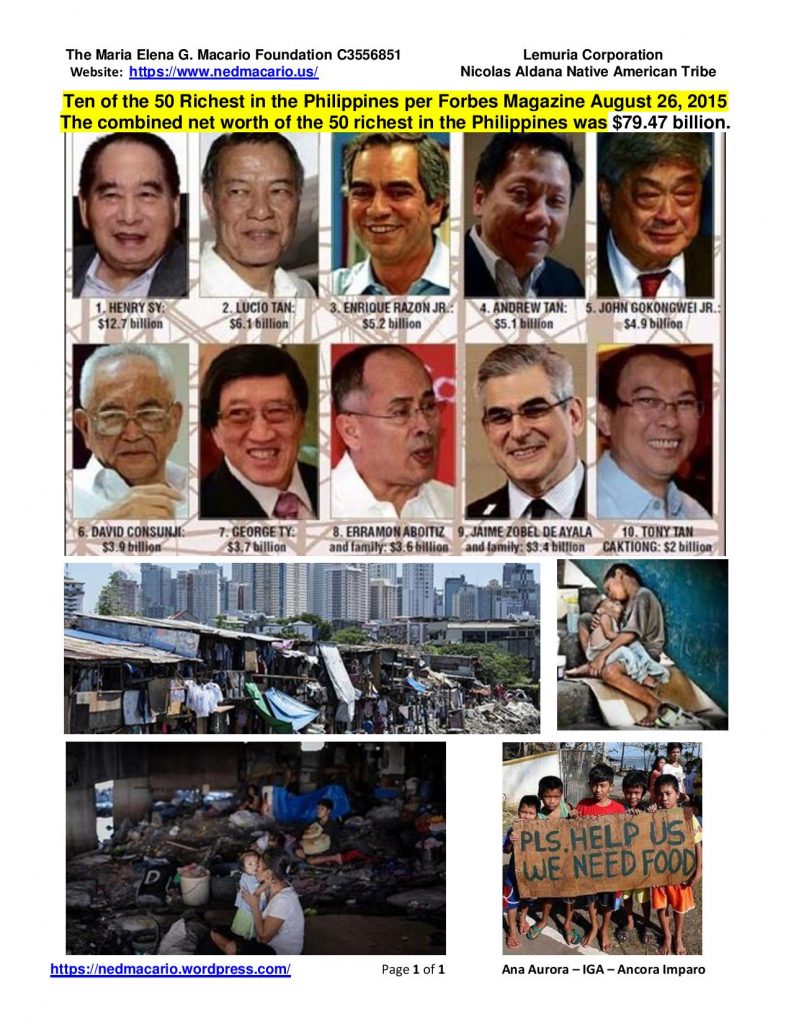
“I don’t know what’s keeping President Aquino from making the formal request for TPS, but I hope he would see the benefits of this to the Filipino people,” she said. “I think the big problem is the inefficiency in our government.”
Read more: https://globalnation.inquirer.net/94053/aquino-mum-on-tps-leaves-immigrants-in-the-dark#ixzz4Sl6SZpCP
Follow us: @inquirerdotnet on Twitter | inquirerdotnet on Facebook
Read more: https://globalnation.inquirer.net/94053/aquino-mum-on-tps-leaves-immigrants-in-the-dark#ixzz4Sl6Dahs3
Follow us: @inquirerdotnet on Twitter | inquirerdotnet on Facebook
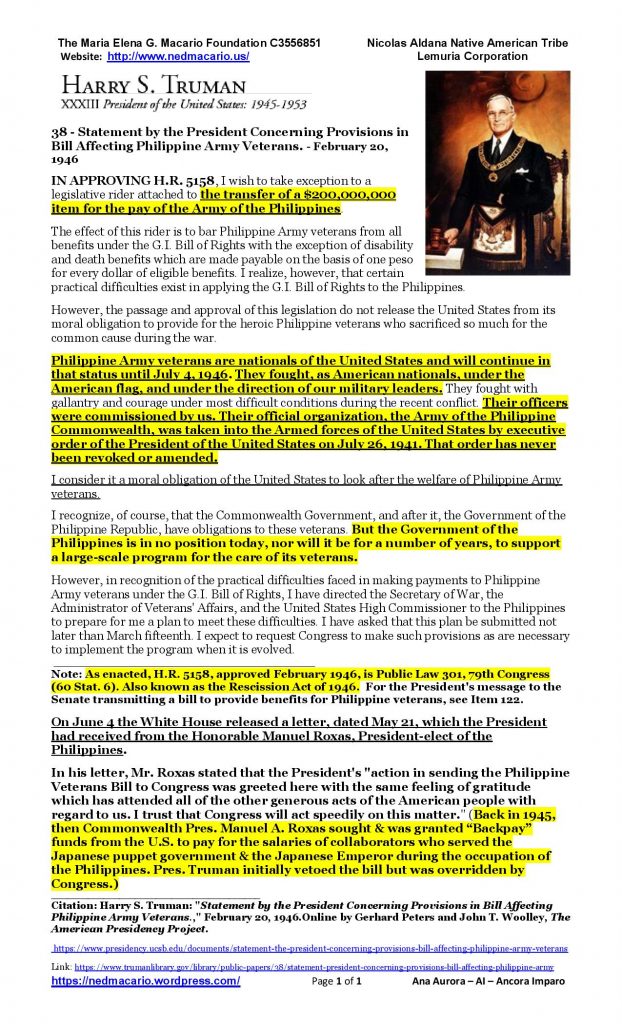
PHOTO Below: Pages from U.S. Passport No. 26589 issued to a Filipino citizen with allegiance to the U.S.A., on March 15, 1930. With the British lobbying for us, Native Americans from the Philippines in Washington DC and throughout the U.S.A., I am confident that we are doing the best possible ways and means to secure what rightfully belongs to our people in the first place – our American nationality and U.S. Passports.
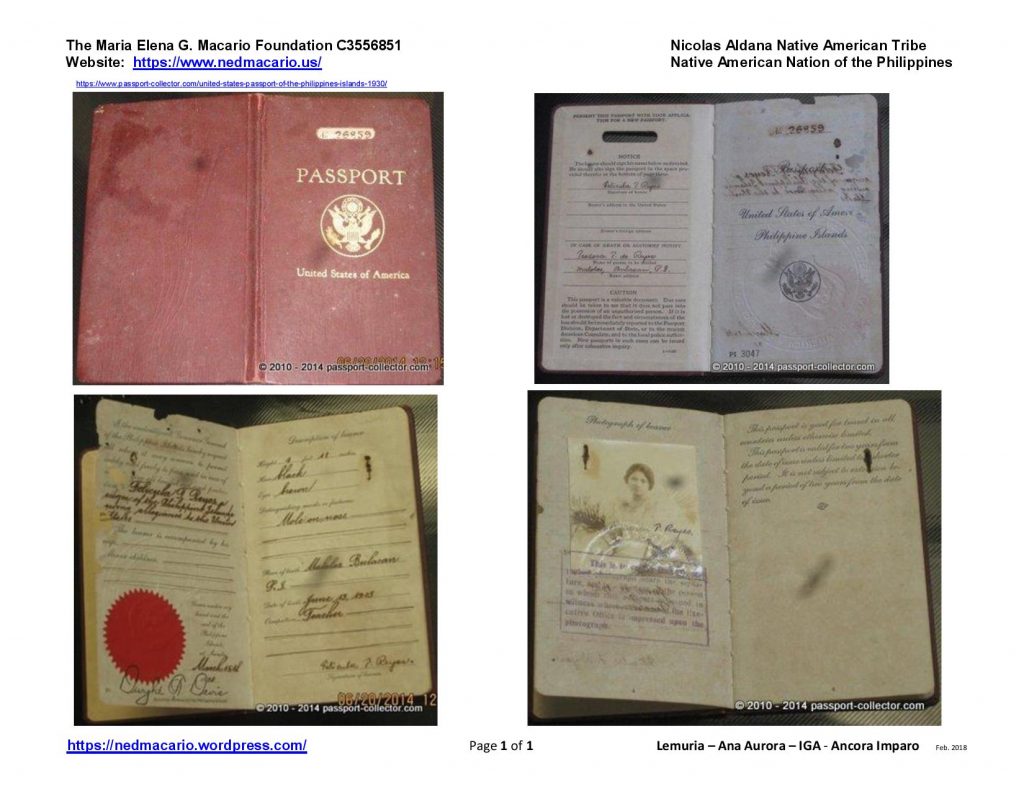
Below is a U.S. passport of an American national but not an American citizen which is what I am seeking for qualified and deserving Filipinos after the restoration of their U.S. nationality taken away from our parents and grandparent WITHOUT DUE PROCESS in 1946.
